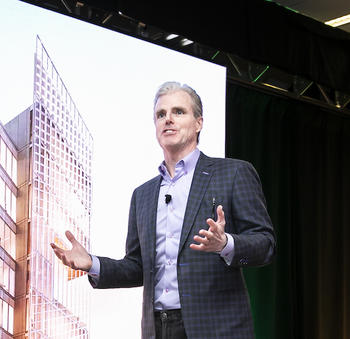Mason alum Paul Misener, JD ’93, founder and principal of Misener Innovation and a former global vice president at Amazon, is this year's Winter Commencement speaker.
Your career spans many fields—science, law, engineering, public policy, etc. What are the advantages of having abilities and credentials in all of these disciplines, and what lesson might there be in that for Mason students and graduates?

Our lives, careers, and nature itself are not organized in tidy unconnected silos, so our learning should not be either. When I attended college 40 years ago, the academic disciplines—usually organized as “departments”—were separate entities, with little or no interaction, even within broader groupings, like the sciences or languages. This traditional separation of disciplines created an enormous missed opportunity for people to share knowledge and techniques. The most fertile areas for discovery today are between two or more of the traditional silos.
I am very proud of Mason’s determination—notably with the new Fuse at Mason Square destination in Arlington—to bridge preexisting academic silos and share learnings across previously separated departments. I was a beneficiary of Mason’s early willingness to bridge silos: In one of the first curriculum experiments of its kind, in the late 1980s, Mason initiated a law and economics program that taught law students like me how these disciplines interact. Now, under President Washington’s leadership, bridging silos is the norm at Mason.
But learning in multiple fields should not end with college graduation. To the contrary, graduation provides new opportunities to explore other areas of education, including in graduate school, of course, but also in nondegree coursework and self-study. And there are no required courses, only decades of electives! As you suggest, a breadth of knowledge also has distinct advantages, such as being able to translate ideas between engineers and policymakers, thus helping to bridge silos.
You were an Amazon vice president for 23 years. How great of a factor was access to talent in Amazon’s decision to move into Northern Virginia, just miles from Mason campuses?
I am a native Northern Virginian and was Amazon’s first employee in Washington, D.C. Of course, I was thrilled with the Amazon HQ2 site selection result and, yes, abundant local talent was a crucial factor in the decision. We Patriots should be proud of our leading role in providing outstanding talent to companies and public sector institutions in the region. As Mason continues to grow in excellence, diversity, and scale, our talent pool will become even more influential.
You undoubtedly have received advice—personally and professionally—that has influenced your life and career. Is there any advice that you want to pass along to the upcoming Mason graduates?
Yes, I definitely have some advice:
Graduates, given the pace of change all around us, you have increasing flexibility in your career to do what you want to do, not just what is advertised as available. When I graduated from college, my continuing education and career were confined to the norms of the prior three or four decades. For graduate school, I needed to choose a single field, and I could not imagine creating a new one. And one’s career at the time usually was built on responding to “want ads” in physical newspapers, in which an employer would announce that it had an opening for a particular position, to do particular things, and sought a person to fill that role. Today, with a bit of patience, your second or third jobs and beyond can be ones that you create together with an employer, not merely accepting what is advertised.
So, I recommend that you graduates spend some time now, early in your post-college life, imagining what you would like to be doing in, say, 10 to 15 years. I emphasize that identifying what you would like to be doing is crucial and is something that you should be able to imagine (and write down) within the next few months. Really, you can do it. And do write it down, maybe as a letter to a friend of yours, to be sent 10 to 15 years from now, telling her what you are doing in your career at that point in the future. Notice that you need not worry now about how you will get to that point; you likely have no clue yet. But that’s OK; you have years to figure out how to get there. And the best way to do that is to plan backwards from the letter you will send to your friend 10 to 15 years from now. What is the previous step before sending that letter? The step before that? And the step before that? All the way back to today.
You received Mason’s Distinguished Alumni Award in 2001 and currently serve Mason in many advisory capacities, including on the President’s Innovation Advisory Council and the board of the Smithsonian-Mason School of Conservation. How important is it for Mason alumni to stay engaged in the university and how is that mutually beneficial?
Staying engaged at Mason provides alumni an opportunity to multiply the benefits of their own university experience—for themselves and others, especially the students who follow them through Mason. And given all the important progress being accomplished at today’s Mason, remaining involved need not be a frivolous act of team spirit—“be true to your school,” as the Beach Boys sang long ago. Rather, today’s Mason is worthy of our strong engagement and support, even if we were not alumni, but much more so because we are.
Graduation News and Stories
- December 18, 2025
- December 18, 2025
- December 17, 2025
- December 15, 2025
- December 12, 2025
